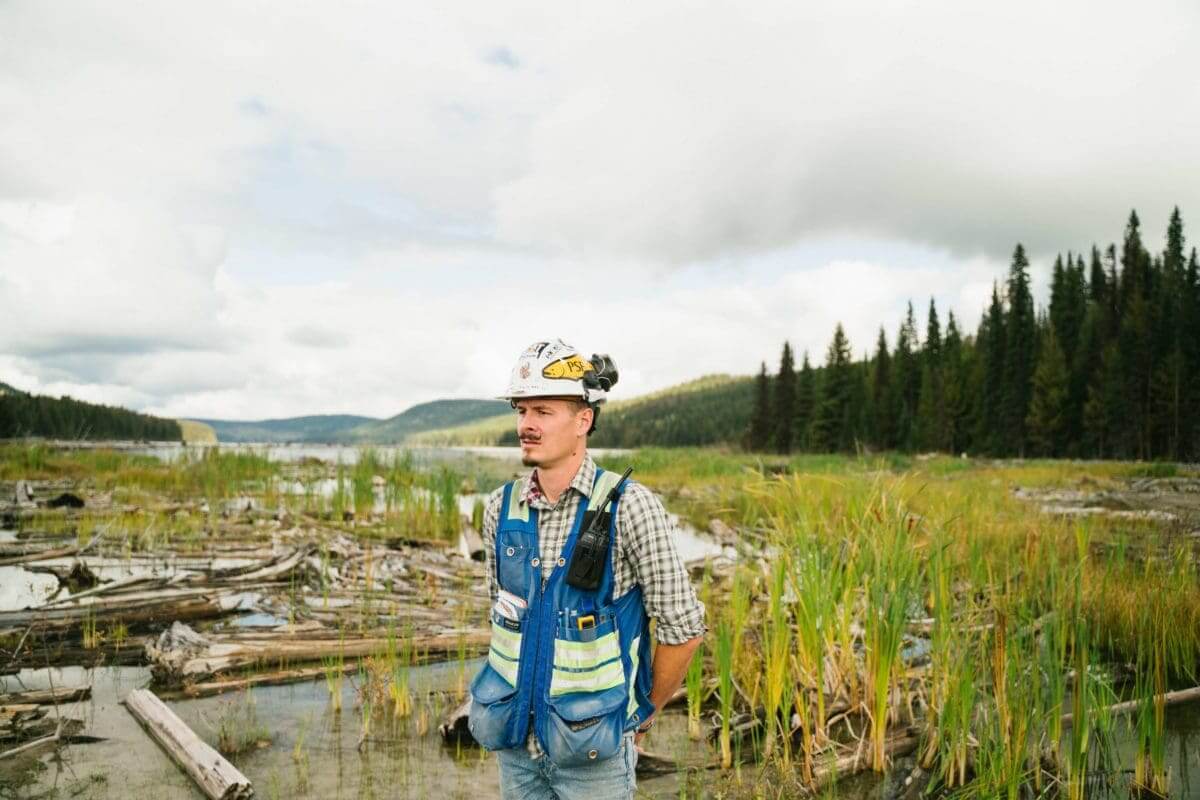
Having a successful career while also helping the environment may seem like a dream, but it’s possible with environmental science jobs. Science careers that study natural environments are in high demand as more people and businesses begin to see the importance of conservation and sustainability.
If you are wondering what can you do with an environmental science degree or asking yourself is environmental science in demand, then you have come to the right place. This guide will answer those questions and more so that you walk away with a clearer understanding of why you should study environmental science and the best environmental science degree jobs for you.

Why Are Environmental Science Careers Important?
Jobs in environmental science are more in demand than ever due to the increased effects of climate change we have seen in the past decade. Environmental scientists tackle issues that affect us all such as pollution and deforestation.
However, becoming an environmental scientist is not the only environmental science career option for those who want to help the Earth. There are so many other equally important environmental science jobs such as park ranger and meteorologist. You may not think of some of these as careers in environmental science, but they are!
Jobs in Environmental Science
At Unity Environmental University, we believe that there is an environmental science job for you, no matter your interests or skills. That’s why we reviewed a range of environmental science careers and salaries from lab technicians to environmental lawyers. Salary and job data come from the Bureau of Labor Statistics (BLS).

Environmental Scientist
What does an environmental scientist do? They study the environment in order to protect it and protect humans. Environmental scientists work for a variety of institutions such as universities, private laboratories, and government organizations. All levels of government, local, state, and federal, employ environmental scientists. The job may require some travel to collect data from a specific site, but mainly the work is done in an office and/or laboratory.
There are many great career options for environmental scientists. Some environmental scientists work in the field collecting samples of soil, water, air, and other organic materials to monitor ecosystems and address environmental problems. They may also provide information and recommendations to government officials and business owners about specific environmental issues or hazards. This means part of being an environmental scientist is writing papers and technical reports, giving presentations, and sometimes educating the general public about critical environmental issues.
Key job skills:
- Knowledge of laws, legal codes, and other government regulations related to the environment
- Strong written and oral communication skills
- Critical thinking and problem solving
- Ability to work collaboratively with diverse groups of people
Average Annual Salary: $76,530
Number of Jobs: 87,100
Recommended Degree Program: B.S. in Environmental Science
Wildlife Biologist
A common question we get from new and prospective students at Unity Environmental University is, “Can I work with animals with an environmental science degree?” The answer is absolutely! Graduates with a Bachelor of Environmental Science often work as wildlife biologists. So, if you know you want to work with animals, you may also want to consider an environmental degree in wildlife conservation.
Wildlife biologists study animals and their relationships to ecosystems. They may work in the field, in an office, or in a lab. The majority of wildlife biologists work for state and federal governments, while some work for research companies or universities.
Key job skills:
- Observation and note-taking
- Knowledge of animals’ anatomy, behaviors, and ecosystems
- Ability to work outside in difficult terrain
Average Annual Salary: $64,650
Number of Jobs: 18,500
Recommended Degree Program: BS in Wildlife Conservation

Environmental Engineer
Like other environmental science jobs, environmental engineers work to solve environmental issues. They may help to design systems or buildings that minimize pollution or conserve rainwater. Environmental engineers work for private companies, non-profits, and government agencies. They often work in offices but may travel to construction sites to provide in-person support.
Key job skills:
- Creative problem-solving and critical-thinking
- Using technology to design and manage solutions
- Ability to work collaboratively with diverse groups of people
Average Annual Salary: $96,820
Number of Jobs: 52,300
Recommended Degree Program: B.S. in Environmental Science
Environmental Consultant
There are environmental science career paths in both the private and public sectors, and environmental consultants are a textbook example of that. Environmental consultants are often hired by corporations, government agencies, and non-profits on a project-by-project basis. They are sometimes known as sustainability consultants.
There are many reasons to choose consultant work such as flexible hours and being your own boss. Environmental consulting is also one of the best jobs after a master’s in environmental science. While a master’s degree in environmental studies is not required for consulting work, it will give you a competitive edge and increase your earning potential.
Key job skills:
- Strong communication skills
- Ability to market yourself
- Multitasking and organization skills to manage multiple clients at once
Average Annual Salary: $76,530
Number of Jobs: 87,100
Recommended Degree Program: MS in Environmental Science
Park Ranger
Do you want an environmental studies career that allows you to spend a lot of time outdoors? Then being a park ranger may be a good fit for you. Park rangers work in private and public parks and recreation areas to keep people and the environment safe. This includes enforcing park rules and educating the public. Rangers may live in the park where they work or nearby. Keep in mind that these jobs are often in remote locations.
Key job skills:
- Ability to be outside and do physical labor
- Strong written and oral communication skills
- Knowledge of relevant laws, rules, and regulations
Average Annual Salary: $63,750
Number of Jobs: 39,000
Recommended Degree Program: BS in Conservation Law Enforcement

Environmental Lawyer
Just like any other lawyer, to become an environmental lawyer, you need to complete law school. However, before you can get into law school, you must earn a bachelor’s degree. A Bachelor’s of Environmental Science will give you a strong foundational knowledge to excel as an environmental lawyer in law school and beyond. Environmental lawyers work with non-profit organizations, government agencies such as the EPA, or in private practices. They focus on cases related to people and the environment often working to advocate for sustainable practices.
Key job skills:
- Knowledge of the U.S. justice system
- Strong public speaking skills
- Passion for helping people and the environment
Average Annual Salary: $127,990 (all lawyers)
Number of Jobs: 804,200 (all lawyers)
Recommended Degree Program: B.S. in Environmental Science
Are you wondering, “What can I do with an environmental science degree to earn six figures?” Explore other high-paying jobs for environmental science majors from the Unity Environmental University news blog.
Environmental Laboratory Technician
This is one of the best jobs for environmental science majors looking for an entry-level position. In fact, you can start working in many environmental lab tech positions after earning an associate’s degree, which only takes two years! However, we still recommend a bachelor’s degree as it will increase your earning potential.
As the name implies, environmental lab techs work in labs. They conduct experiments and collect data to address various environmental issues. This job may require travel to collect data from different sites. Technicians often work alongside environmental scientists and engineers to solve current environmental issues and prevent future ones.
Key job skills:
- Ability to use and maintain lab equipment
- Knowledge of safety protocols
- Collecting and analyzing data
Average Annual Salary: $47,370
Number of Jobs: 34,200
Recommended Degree Program: BS in Environmental Health and Safety
Meteorologist
Meteorologists study weather patterns to predict, track, and monitor future weather. This allows us to prepare for impending natural disasters. Meteorologists also help us understand the impacts that climate change has on weather patterns and how those changes directly impact people worldwide.
Meteorologists often work for government agencies such as NASA and NOAA. Others work for universities doing research or for private companies like TV news stations. Some meteorologists may have to travel for work to collect data from specific weather events or provide on-site support during a natural disaster.
Key job skills:
- Using technology to analyze big data
- Strong written and oral communication
- Ability to think quickly under pressure
Average Annual Salary: $94,570
Number of Jobs: 10,700
Recommended Degree Program: BS in Environmental Science and Climate Change
How to Get a Job in Environmental Science
For high school students, prepare for your future career in environmental science by focusing on math, biology, chemistry, and physics classes. Make sure to take an environmental science elective if your school offers it. You will also need strong speaking, reading, and writing skills to excel in environmental science. Most environmental science jobs require at least a bachelor’s degree in environmental studies or a related field. Enrolling in a four-year program after high school is a good place to start.
Explore a Bachelor of Science in Environmental Science at Unity Environmental University
What can you do with an environmental studies degree? A degree in environmental science can set you up to make a lasting impact on the Earth. Begin your journey today with one of Unity Environmental University’s hands-on, flexible, and affordable environmental science programs.

Start Your Career in Environmental Science with Unity Environmental University
Want to learn more about different environmental studies careers? Unity Environmental University has a vast collection of articles on environmental jobs working with animals, the ocean, sustainable businesses, and more. We can help you find the right career path for you and the right degree program to get you there. So whether you want to work outdoors among plants and animals or in a lab solving real-world problems, it all starts with a degree from Unity Environmental University.
